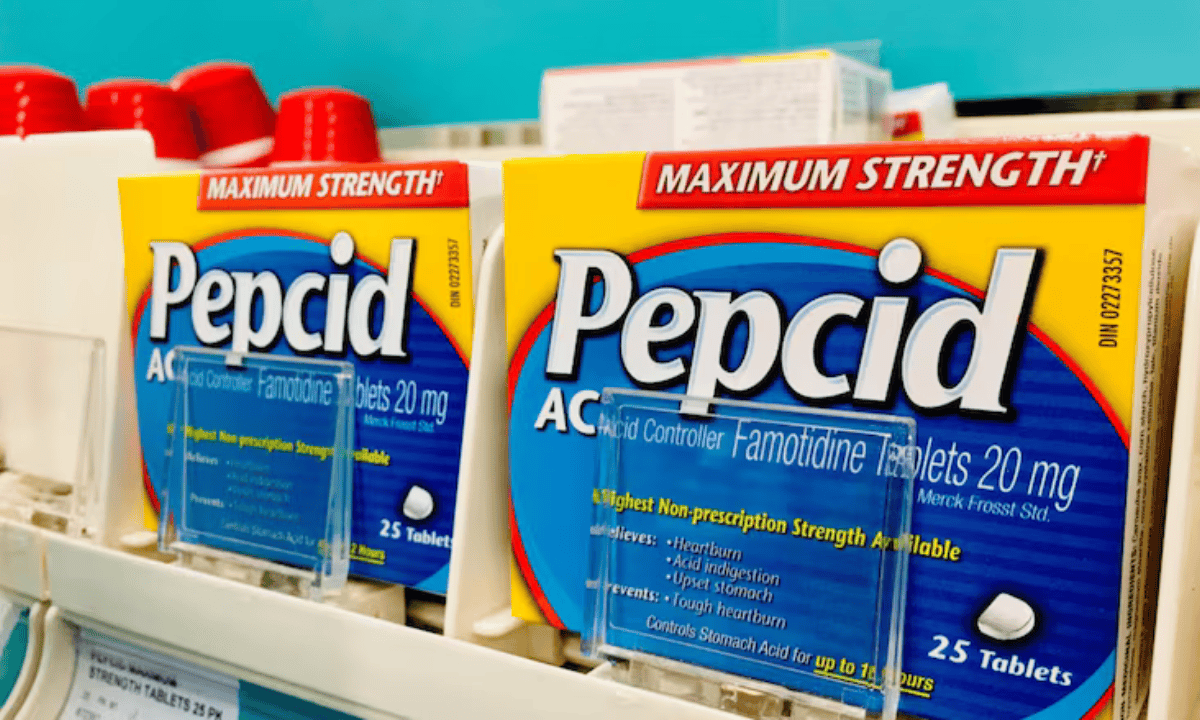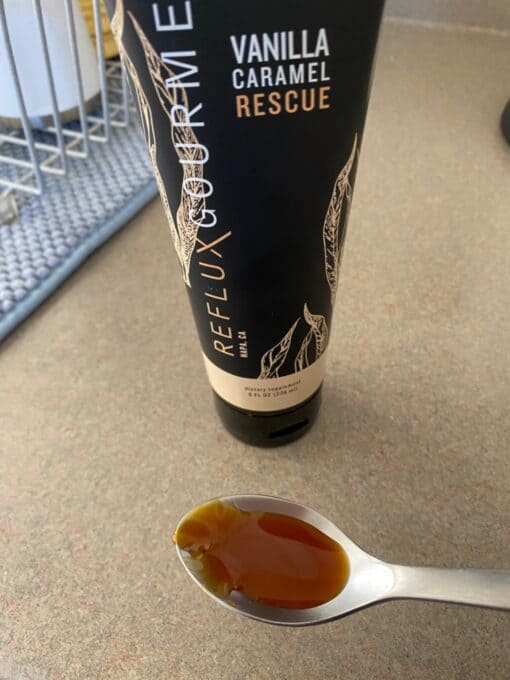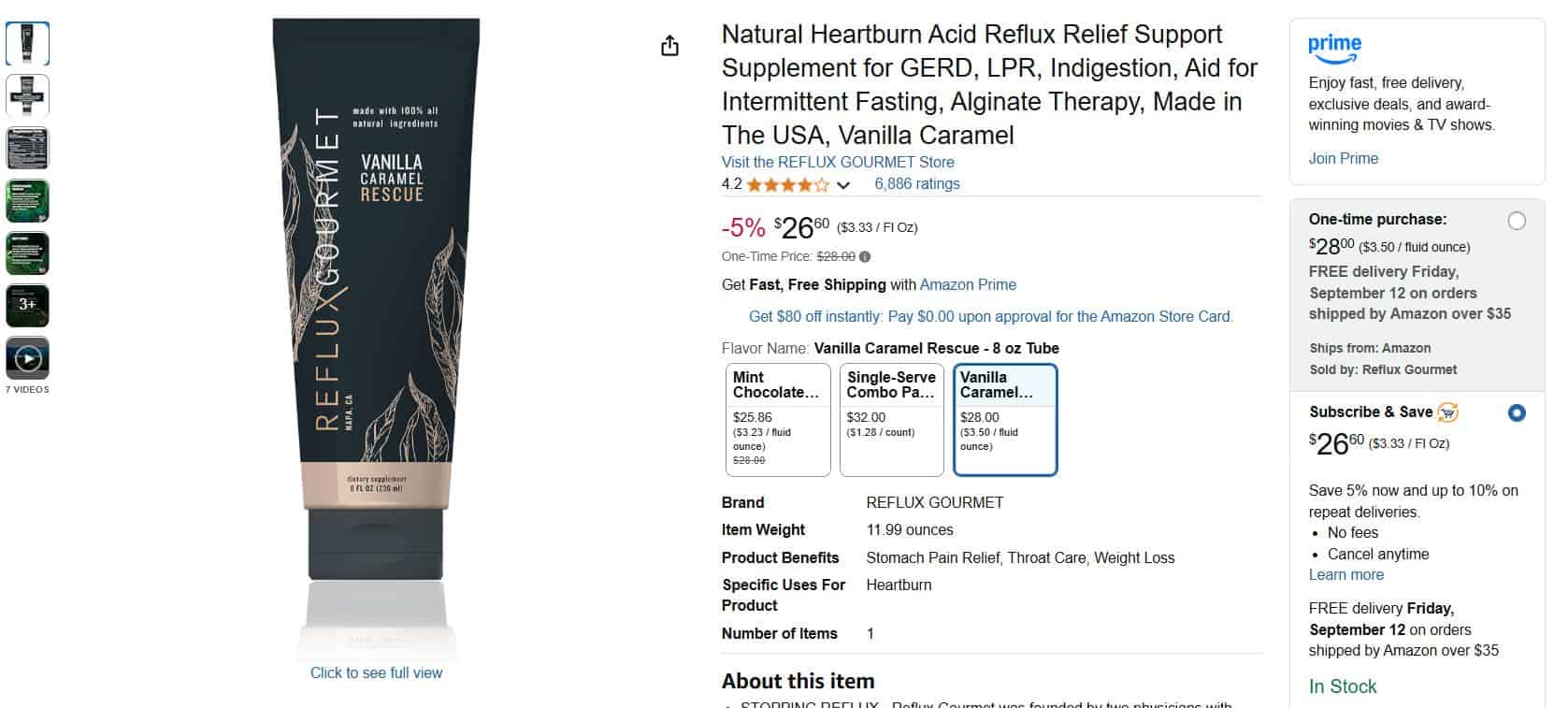Heartburn is a miserable condition that plagues most of us from time to time, with many of us suffering from long-term acid reflux issues like GERD. And when you’re suffering, you need relief NOW.
Two products that work to fight off symptoms of reflux are Pepcid, a traditional med that’s been around for ages, and one you can find at your local drugstore, and Reflux Gourmet, a natural supplement that uses an alternative method to manage reflux through a delicious medium.
But which one is better?
I looked into both to bring you the answer.
Topic Contents
How It Works
Before we look at how each of these two works, let’s look at how reflux treatments can work in general.
There are a few ways a drug can work in your body to reduce reflux symptoms, including:
- Acid neutralizers- Pepcid and Rolaids, and some natural antacids, use calcium carbonate or magnesium hydroxide to actively neutralize stomach acid by raising the pH level.
- Proton pump inhibitors (PPIs)- Common meds intended for longer-term use, like omeprazole, reduce acid production by blocking proton pumps in the stomach lining, preventing them from pumping too much acid into the stomach.
- Protective coatings- Some drugs, like sucralfate, or natural supplements, like slippery elm bark, create a protective layer over the stomach and esophagus lining to cover the organ tissue so the acid can’t damage it.
- Alginate-based therapies– Some supplements create a physical barrier in the form of a gel “raft,” made from algae, that floats on top of stomach contents to prevent acid from spilling into the esophagus.
- Antacids with added soothing compounds- Some formulas combine neutralizing agents with other soothing ingredients like bismuth or aluminum hydroxide to reduce any irritation.
Now, let’s look at how these two work.
Reflux Gourmet
Reflux Gourmet uses an alginate-based approach. This means using an active compound found in algae, specifically sodium alginate, to form a gel-like raft in your digestive system that sits on top of your stomach contents, preventing acid from spilling up into the esophagus, causing that burning sensation.
It also contains sodium bicarbonate (baking soda), which is a natural, long-trusted acid-neutralizing agent. This combination provides immediate relief, a balance check for acid, and a physical preventative from the discomfort of heartburn.

Pepcid
Pepcid contains an active ingredient, famotidine (20 mg), which is actually an H2-receptor antagonist or H2-blocker. Here’s how that works.
When you eat, your body releases a chemical called histamine. This chemical travels to the cells in your stomach lining, where it bonds to the H2 receptors there. This triggers the proton pumps in your stomach to release acid to aid in digestion.
The famotidine in Pepcid actually bonds to and blocks some of those H2 receptors. This means fewer histamines can bond to these receptors, leading to less acid being secreted in the stomach. This is an effective method, but it isn’t an immediate one, and the label instructs the consumer to take it 10 to 60 minutes before a meal.
Some Pepcid products may come with additional acid-fighting ingredients like calcium carbonate and magnesium hydroxide for more immediate relief, but the original Pepcid does not have these.

Winner: Reflux Gourmet
Ingredients
Acid reflux medications can include a wide variety of ingredients. Some are natural and some are manmade. Some are clinically studied, and some only have anecdotal evidence. Some are active, and some are additional ingredients to add flavor, stabilize the active ingredients, or preserve freshness.
Reflux Gourmet
Reflux Gourmet boasts a pretty short list of ingredients that all serve a purpose.
Active ingredients: Reflux Gourmet’s Proprietary Alginate Complex (425 mg), which includes calcium pantothenate (the calcium salt of vitamin B5, good for metabolism and cellular health), sodium alginate (active compound found in kelp), and sodium bicarbonate (acid neutralizer).
Other ingredients: dextrose (a sugar similar to your own blood sugar), deionized water, natural flavor, grapefruit seed extract, and polylysine (drug delivery carrier for absorption).
All of these are helpful, serve a purpose for the supplement, and are largely regarded as healthy and safe.
Pepcid
Pepcid is a traditional OTC medicine, so it uses more chemical compounds to ensure a longer shelf-life.
Active ingredient: famotidine (20 mg) works on H2 receptors to block them and decrease acid production.
Other ingredients: carnauba wax (plant-based tablet-coating agent), hydroxypropyl cellulose (plant-based polymer used as a binding agent for tablets), hypromellose (another binder), magnesium stearate (tablet lubricant), microcrystalline cellulose (another binder), pregelatinized starch (binder, disintegrant) talc (lubricant, filler, anti-caking agent), and titanium dioxide (enhance appearance of pill).
The big issue here is talc, which is known to contain traces of asbestos naturally. Most of us know about the perils and health risks of asbestos, and ingesting it is not something some of us are willing to do. That list of inactive ingredients is also pretty long, since it is in tablet form and has to be stored on shelves for longer.
Winner: Reflux Gourmet
Effectiveness
How well these work is different because they work in such different ways. One offers better immediacy, while the other offers better long-term effects, and is used to treat additional digestive tract issues like ulcers or esophagitis.

Reflux Gourmet
Reflux Gourmet wins in terms of immediacy. I personally use this one, and I take a teaspoon of the gel after every meal and before bed, and it starts working immediately. I don’t notice any heartburn following meals, and it doesn’t keep me up at night.
This also seems to be the experience of many users; while Reflux Gourmet is newer, alginate therapy has been an effective treatment for reflux that has been studied in this application since the 1990s.
It’s effective and has proven to be more effective than antacids (like those found in Tums!), but less effective than H2 blockers or PPIs that treat acid production at the source. This makes it a great supplement for immediate relief, but probably not enough to treat your most severe symptoms.
Pepcid
Pepcid’s active ingredient is effective in the long-term management of acid production in the stomach. The way that it works also makes it effective in treating stomach ulcers, which is not a claim that alginate therapies make.
The downside to original Pepcid is that it takes a bit to kick in. It doesn’t have any ingredients that immediately neutralize acid, so you could be waiting 30 minutes or more for heartburn relief unless you take it at least 10 minutes before your meal.
Clinical studies show that H2 blockers and PPIs are the most effective treatments for GERD and related acid production issues.
Winner: Pepcid
Side Effects and Safety
Taking any medication or supplement comes with some risks and necessary health concerns. It’s important to know how safe these drugs are and what kinds of side effects you can expect from each of them.
Reflux Gourmet
Reflux Gourmet contains 100% natural ingredients that have been used for a very long time and are largely tolerated and safe to consume.
However, it’s important to note that, since Reflux Gourmet is a dietary supplement, it’s not regulated by the FDA. Its active ingredient, sodium alginate, is considered Generally Recognized As Safe (GRAS) by the FDA for use as a food additive, so it’s at least okay to put in your body. The FDA just can’t confirm its claims.
Alginates have virtually no side effects, but everyone’s body is different. While side effects with Reflux Gourmet are rare, some users could experience mild constipation or diarrhea, bloating, or changes in taste.
Pepcid
Pepcid is regulated and approved by the FDA, so it has the governmental stamp of approval in regards to ingredient safety and effectiveness, which is a valid big selling point for many consumers.
However, it also has more problematic ingredients that users feel are not actually safe. The biggest concern is the inclusion of talc, which, while most is asbestos-free, still raises some health concerns around ovarian cancer, usually when used around the genitals. Anything remotely carcinogenic is going to raise concern.
As for side effects, there is a longer list that includes headache, nausea, dizziness, central nervous system issues like seizures or drowsiness, allergic reactions like hives or difficulty breathing, and cardiovascular and liver problems.
Winner: It depends
Ease of Use
When it comes to taking supplements, everyone has their preferred method. Here’s how each of these is consumed and how easy it is to take them.
Reflux Gourmet
Reflux Gourmet comes in a tube of gel. It’s a reasonably thick but smooth consistency, and the flavor I have is vanilla caramel, though they also have a chocolate mint version. The flavors were actually developed by a professional chef, which makes the supplement super easy (and even enjoyable) to take.
I can see this being a great option for people who have issues swallowing pills (or who just hate taking them), which is great for accessibility.
It is recommended to take a teaspoon after every meal and one before bed, which is kind of frequent if you’re a forgetful person.

Pepcid
Pepcid comes in the form of a small coated tablet that doesn’t taste awful and is relatively easy to take. All you have to do is swallow one with a glass of water (don’t chew!) either 10 to 60 minutes before your meal or after it.
You can only take it twice in a day, and it takes about 15 minutes to half an hour for it to start relieving heartburn after you eat a meal.
Winner: Reflux Gourmet
Price
Definitely an important factor here is price. How much does each cost overall, and what does the value look like for each?
Reflux Gourmet
Reflux Gourmet Rescue is $28 for an 8-oz tube, which gives you about 47 servings of a teaspoon each. That brings the cost to about $0.60 per serving.

Pepcid
Pepcid has more variation in pricing because it offers different sizes. The larger the quantity you buy, the lower the cost per serving drops. You can get an 8-pack for $9 or 100 tablets for around $40, making the cost per serving as high as $1.13 and as low as $0.40.
Winner: Pepcid
So, Which Is Better?
Ultimately, which one is better depends on your needs and health goals, and both have their own benefits. Pepcid is backed by more clinical studies and regulations and can be cheaper, but Reflux Gourmet is a more pleasant experience with fewer side effects at a relatively comparable cost. It may not be a bad idea to keep both on hand.
Alt Protein Team is a team of professionals and enthusiasts committed to bringing you the most up-to-date information on alternative protein, health and wellness, workouts, and all things health-related. We’ve reviewed a lot of products and services so you don’t have to guess when you spend your hard-earned money on them. Whether you want to shed some pounds, build lean muscle or bulk, we can help you figure out what you need to do and what you need to have to achieve your goals.







